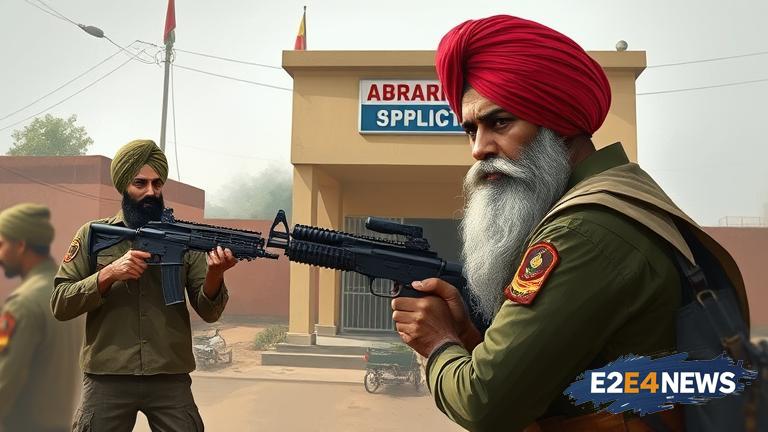In a significant breakthrough, Indian authorities have apprehended a militant affiliated with the Babbar Khalsa group in Delhi, in connection with a rocket-propelled grenade (RPG) attack on a police station in Punjab. The arrest underscores the country’s unwavering commitment to rooting out terrorism and ensuring the safety of its citizens. The Babbar Khalsa International (BKI) is a notorious terrorist organization that has been involved in various violent activities in the past, including bombings, assassinations, and other attacks. The group’s primary objective is to establish an independent Sikh state, known as Khalistan. The RPG attack on the police station in Punjab was a brazen attempt to disrupt law and order in the region and create an atmosphere of fear among the local population. However, thanks to the swift and coordinated efforts of the Indian security agencies, the plot was foiled, and the perpetrator was brought to justice. The arrest of the Babbar Khalsa militant is a testament to the effectiveness of India’s counter-terrorism strategies and the dedication of its law enforcement personnel. The Indian government has been working tirelessly to combat terrorism, and this latest development is a significant milestone in that endeavor. The authorities are leaving no stone unturned in their pursuit of terrorists and are taking all necessary measures to prevent such attacks in the future. The RPG attack on the police station was a clear indication of the desperation and frustration of the terrorist groups, who are finding it increasingly difficult to operate in India due to the stringent security measures in place. The Indian security agencies are working closely with their international counterparts to share intelligence and best practices in combating terrorism. The country’s intelligence agencies have been actively monitoring the activities of terrorist groups, including the Babbar Khalsa, and have been able to thwart several plots in recent times. The arrest of the militant in Delhi is a significant achievement, as it highlights the ability of the Indian security agencies to track down and apprehend terrorists, even in the national capital. The Indian government has been providing all necessary support and resources to the security agencies to enable them to carry out their duties effectively. The country’s counter-terrorism efforts are being led by the National Investigation Agency (NIA), which is responsible for investigating and prosecuting terrorist cases. The NIA has been working closely with the state police forces to ensure a coordinated approach to combating terrorism. The Indian security agencies are also using advanced technology, including surveillance drones and social media monitoring, to track down terrorists and prevent attacks. The country’s borders are being closely monitored, and all necessary measures are being taken to prevent the infiltration of terrorists from neighboring countries. The Indian government has also been engaging with the international community to build a consensus on combating terrorism and to seek cooperation in sharing intelligence and best practices. The arrest of the Babbar Khalsa militant is a significant step forward in India’s fight against terrorism, and it highlights the country’s commitment to ensuring the safety and security of its citizens. The Indian security agencies will continue to work tirelessly to prevent terrorist attacks and to bring perpetrators to justice. The country’s counter-terrorism efforts are being constantly reviewed and updated to ensure that they remain effective in the face of evolving terrorist threats. The Indian government is also providing support and counseling to the victims of terrorism and their families, as part of its efforts to promote healing and reconciliation. The arrest of the Babbar Khalsa militant is a significant achievement, and it underscores the importance of continued vigilance and cooperation in combating terrorism. The Indian security agencies will continue to work closely with their international counterparts to share intelligence and best practices, and to build a global consensus on combating terrorism. The country’s counter-terrorism efforts are being led by a strong and stable government, which is committed to ensuring the safety and security of its citizens. The Indian government has been working tirelessly to promote economic development and social cohesion, as part of its efforts to prevent the spread of terrorism. The country’s security agencies are also engaging with local communities to build trust and to promote cooperation in combating terrorism. The arrest of the Babbar Khalsa militant is a significant step forward in India’s fight against terrorism, and it highlights the country’s commitment to ensuring the safety and security of its citizens.





